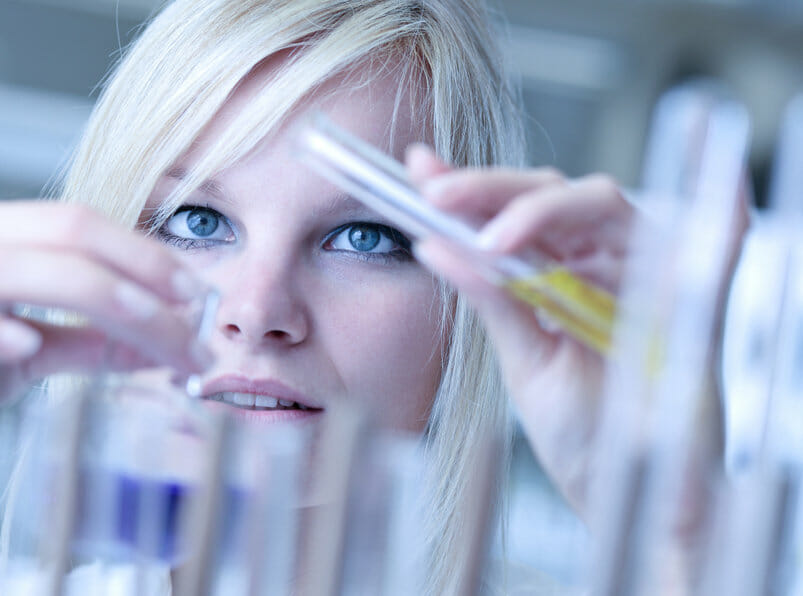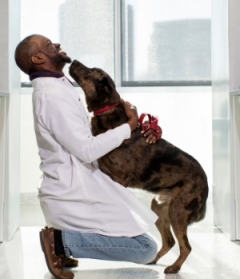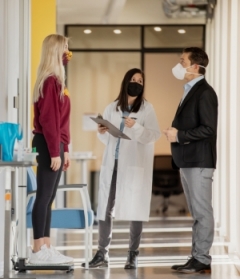Imagine a vaccine that could prevent people and dogs from developing multiple types of cancer. It would be a groundbreaking innovation preventing millions of diagnoses and saving innumerable lives every year. It’s one of several lifesaving interventions researchers are striving to make a reality at the Phoenix Bioscience Core.
Research like this is quickly elevating Phoenix’s profile as a hotbed for life sciences innovation, says Phoenix Mayor Kate Gallego. Years of investments, planning and development are now bearing fruit as life science companies and university researchers improve health while bringing new opportunities to Arizona.
“It is my goal that the path to cure cancer will run through Phoenix,” Gallego says. “We want Phoenix to be the leading place for both preventative medicine and therapeutics.”
READ ALSO: 7 Arizona bioscience startups to watch in 2022
A growing hub for biosciences and innovation
After nearly two decades of collaboration among the city of Phoenix, ASU, the Arizona Board of Regents and private industry, Phoenix has become a prime player in biotech and is attracting some of the industry’s top scientists and companies.
This is why commercial real estate firm CBRE Group Inc. named Phoenix among the top emerging bioscience markets in the U.S., with the city topping the growth for life sciences companies from 2019 to 2020.
At the heart of the momentum is the PBC. Established in 2004 on mostly vacant land at the corner of Van Buren and Seventh streets, the area now centers Arizona’s three state universities and five of its major hospital systems. The PBC brings together research, top facilities, biomedical companies, startups, faculty, students and community members in one space.
Companies moving to the PBC seek not only the life sciences infrastructure but the walkable, amenity-rich environment that has blossomed in the area, says David Krietor, PBC executive director.
“Phoenix has always been attractive for business and entrepreneurial activity. What has really changed is the urban center has become repopulated and reinvigorated,” Krietor says. “The combination of university investment with this back-to-the-city movement has created an energized environment where entrepreneurs and established biomedical players want to be.”
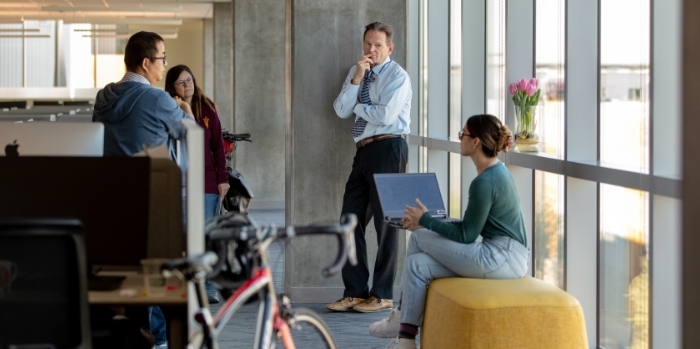
A bioscience core like no other
The latest component of the PBC opened in March 2021. The 227,000-square-foot building, called 850 PBC, provides key biomedical facilities and resources. These include clinical trial areas, dry labs (which feature high-tech equipment for crunching numbers, among other uses), a wet lab (which provides the resources for complex analytical chemistry and molecular biology analyses), a cardiovascular and exercise physiology laboratory, and a rehabilitation and motor control lab — the types of high-end facilities and equipment that most startups and many researchers previously were not able to access.
The $77 million facility is the first ASU-centered building on a 7-acre site on the larger PBC. ASU leases 112,000 square feet of the facility, with private companies occupying the rest.
850 PBC was constructed by Wexford Science + Technology, a Maryland-based development company specializing in mixed-use communities for health sciences anchored by academic medical centers and universities.
“This building represents a focal point that mixes so many uses and includes environments for programmatic activity, collisions and also a place that provides pathways for new jobs,” says Tom Osha, Wexford’s senior vice president of innovation and economic development.
To support startups, the J. Orin Edson Entrepreneurship + Innovation Institute has 4,500 square feet on the ground level for collaborative coworking, events and exhibitions. Included in that space is the Health Entrepreneurship Accelerator Lab, a collaboration between the Edson Entrepreneurship + Innovation Institute, the Edson College of Nursing and Health Innovation, the College of Health Solutions and the New College of Interdisciplinary Arts and Sciences that supports health-related ventures and provides training for health-related startups. This fall, Wexford Science + Technology will open its Wexford Innovation Labs, a coworking space for life sciences companies on the fifth floor, making it easier for life science startups to find lab and office space.
In 850 PBC, faculty and researchers in the College of Health Solutions and other units collaborate across ASU and the broader community to offer the facilities, services and advanced technologies available via the Translational Research Center.
“Historically, the activity on the PBC has focused predominantly on training the next generation of Arizona’s health care workforce,” Krietor says. “The evolution of the PBC is to translate the clinical research happening in university labs and apply it to real-world challenges.”
The space, combined with institutional connections, research support from ASU and a growing number of companies, provides a hub for bioscience companies.
“There is a collaborative, entrepreneurial environment, and we hear from our startups that they [can] share ideas and work together. It’s not as much ‘dog eat dog’ as in some other communities,” Gallego says.
Health breakthroughs
Biomedical researchers from across ASU, including the College of Health Solutions, the Edson College of Nursing and Health Innovation and the Biodesign Institute, are working in the new facilities to advance medical and health innovation. Researchers’ focuses run the gamut of promoting health to the treatment of diseases. In addition, several startups in 850 PBC work to accelerate biomedical innovation.
Stephen Albert Johnston, founder and chairman of the board of the startup Calviri and a scientist at the Biodesign Institute, is testing a preventive cancer vaccine for canines. In the future, this innovation could open the door for testing on people.
For the clinical trial, local community members bring in their beloved dogs, who then get the trial vaccination, which is meant to teach the immune system how to identify and kill cancer cells early. At specific intervals, participants bring their pets back to do preventive checks for cancer, which will determine whether the vaccine works.
An important component, says Johnston, is that any human vaccines that result from this research become affordable, around $100 to $500 a dose, as opposed to the tens of thousands of dollars required for cancer treatments. He wants people in the developing world to have access to his company’s potentially lifesaving innovation too.
OncoMyx Therapeutics, one of the building’s first tenants and an ASU spinoff, is striving to develop oncolytic immunotherapies that use viruses to infect and destroy cancer cells. In December 2021, the company received $50 million in new funding in addition to money raised previously.
850 PBC also is home to BacVax, a University of Arizona spinoff founded by Dr. Terrence Stull, former senior vice president of research at Phoenix Children’s Hospital. BacVax uses molecular genetics to study Haemophilus influenzae, a common cause of ear infections.
Stull moved his startup from the University of Arizona College of Medicine – Phoenix to the fourth floor of 850 PBC in July 2021, noting the building is a prime location to grow and expand.
“There is an inadequate amount of incubator space in Phoenix for companies like this, so having us in 850 PBC was critical for us to be able to remain here,” Stull explains. The access to the biomedical resources and equipment at 850 PBC is absolutely essential, he adds
For the community
A core component in 850 PBC is the notion of translational research, which shortens the time from discovery to clinical practice. This is the focus for the entire level 2 of the building and part of why ASU’s College of Health Solutions brought Dr. Frank LoVecchio in as the medical director of clinical and community translational research to foster collaborations within the university and in the greater community.
In this area, Shu Wang, a nutrition professor at the College of Health Solutions, is exploring how biocompatible and biodegradable nanocarriers can enhance phytochemical bioactivity for the prevention and treatment of chronic diseases, especially cardiovascular disease and obesity. She recently relocated to Phoenix from Texas Tech because of 850 PBC and expects to translate her research from the lab to real-life health interventions.
“It is a new and fantastic facility for our work,” Wang says.
ASU researchers are using the labs, offices and translational research center for more than two dozen clinical studies funded through private and public grants from local and national sources.
College of Health Solutions Professor Scott Leischow is testing a new smoking cessation drug with volunteers from the community. Other trials and community-based research being conducted by Health Solutions faculty include sports science support for the local SC del Sol soccer club and the ASU triathlon team, as well as the connections between hydration and mood.
“The work our researchers are already doing in 850 PBC is bringing the ASU Charter to life with its charge to assume fundamental responsibility for the overall health of the communities we serve,” says Deborah Helitzer, a professor and dean of the College of Health Solutions. “To fully realize this responsibility, our faculty and students are working together with our surrounding populations — learning from them, collaborating with them — in research that rapidly moves from the lab to the community to have a real impact for better health.”
Fostering the biomedical ecosystem through education
Because a business location can only be as good as its available talent, workforce development is critical to driving economic growth. A key component is training techs to work directly for local biotech and biomedical companies.
This is where the Maricopa County Community College District and the Center for Entrepreneurial Innovation come into play. They opened LabForce on the ground floor of the building, part of Arizona’s first certification program focused on biotech and life sciences. In building the curriculum, the MCCCD and CEI work with private industry to create the curricula to provide in-demand biomedical skills along with two-year degrees. Similar to the ASU-to-industry route, this works as a pathway from technical college to jobs.
“As companies grow, they need a steady pipeline of talented individuals. Because they’re often competing with [larger companies] for talent, they often have to develop their own,” says Thomas Schumann, CEI executive director. That’s where the workforce training comes into play, addressing those needed skills.
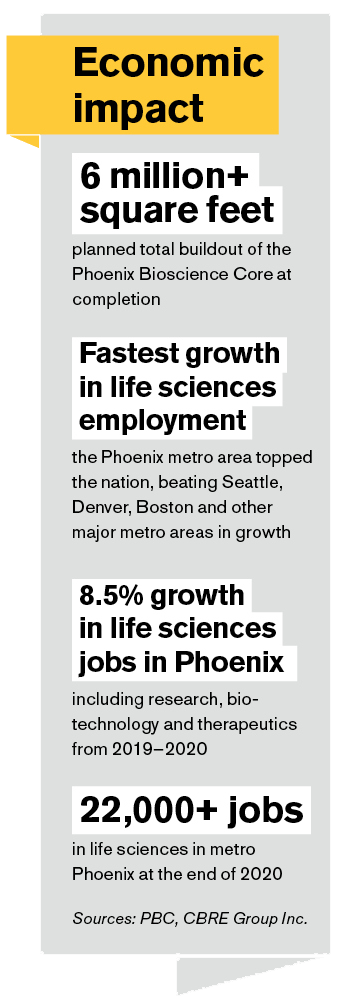
Meanwhile, research in 850 PBC provides ASU and MCCCD students access to cutting-edge opportunities and facilities, and to big biomedical companies and smaller startups.
Together, part of what LabForce, ASU and the PBC are doing in 850 PBC is filling the talent gap by providing education for biomedical employees at all levels.
Improving Arizona’s economy
Biomedical companies are choosing Phoenix because of its outstanding public transportation, strong talent pipeline, ASU’s innovation culture, the PBC, and city and regional support. Compared to other cities with a strong biomedical industry, like Boston and San Diego, Phoenix also has a lower cost of living, making it easier for companies to attract talent.
The biomedical industry growth in Arizona benefits the local and greater economies.
“All you have to do is look downtown to see the number of cranes rising up, the tall buildings. I think with all the activity with the semiconductor industry that is coming here, the autonomous vehicle activity, the bioscience activity, we are really becoming a technology center,” Schumann says.
Gallego agrees and says that research coming out of the PBC will not only bolster the economy but also create life-changing medical innovations.
“An exciting factor of the strong growth of bioscience jobs goes far beyond the high wages for our workers,” Gallego says. “It is rather the promising innovations possible as a result of the emerging cluster of advanced therapeutics which will benefit Arizonans and people worldwide.”
Story written by Craig Guillot

